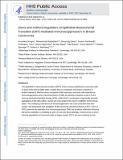Direct and Indirect Regulators of Epithelial–Mesenchymal Transition–Mediated Immunosuppression in Breast Carcinomas
Author(s)
Dongre, Anushka; Rashidian, Mohammad; Eaton, Elinor Ng; Reinhardt, Ferenc; Thiru, Prathapan; Zagorulya, Maria; Nepal, Sunita; Banaz, Tuba; Martner, Anna; Spranger, Stefani; Weinberg, Robert A; ... Show more Show less
DownloadAccepted version (2.956Mb)
Open Access Policy
Open Access Policy
Creative Commons Attribution-Noncommercial-Share Alike
Terms of use
Metadata
Show full item recordAbstract
The epithelial-to-mesenchymal transition, which conveys epithelial (E) carcinoma cells to quasi-mesenchymal (qM) states, enables them to metastasize and acquire resistance to certain treatments. Murine tumors composed of qM mammary carcinoma cells assemble an immunosuppressive tumor microenvironment (TME) and develop resistance to anti-CTLA4 immune-checkpoint blockade (ICB) therapy, unlike their E counterparts. Importantly, minority populations of qM cells within a tumor can cross-protect their more E neighbors from immune attack. The underlying mechanisms of immunosuppression and cross-protection have been unclear. We demonstrate that abrogation of qM carcinoma cell–derived factors (CD73, CSF1, or SPP1) prevents the assembly of an immunosuppressive TME and sensitizes otherwise refractory qM tumors partially or completely to anti-CTLA4 ICB. Most strikingly, mixed tumors in which minority populations of carcinoma cells no longer express CD73 are now sensitized to anti-CTLA4 ICB. Finally, loss of CD73 also enhances the efficacy of anti-CTLA4 ICB during the process of metastatic colonization.</jats:p>
</jats:sec>
<jats:sec>
<jats:title>Significance:</jats:title>
<jats:p>Minority populations of qM carcinoma cells, which likely reside in human breast carcinomas, can cross-protect their E neighbors from immune attack. Understanding the mechanisms by which qM carcinoma cells resist antitumor immune attack can help identify signaling channels that can be interrupted to potentiate the efficacy of checkpoint blockade immunotherapies.
Date issued
2021Department
Massachusetts Institute of Technology. Department of BiologyJournal
Cancer Discovery
Publisher
American Association for Cancer Research (AACR)
Citation
Dongre, Anushka, Rashidian, Mohammad, Eaton, Elinor Ng, Reinhardt, Ferenc, Thiru, Prathapan et al. 2021. "Direct and Indirect Regulators of Epithelial–Mesenchymal Transition–Mediated Immunosuppression in Breast Carcinomas." Cancer Discovery, 11 (5).
Version: Author's final manuscript